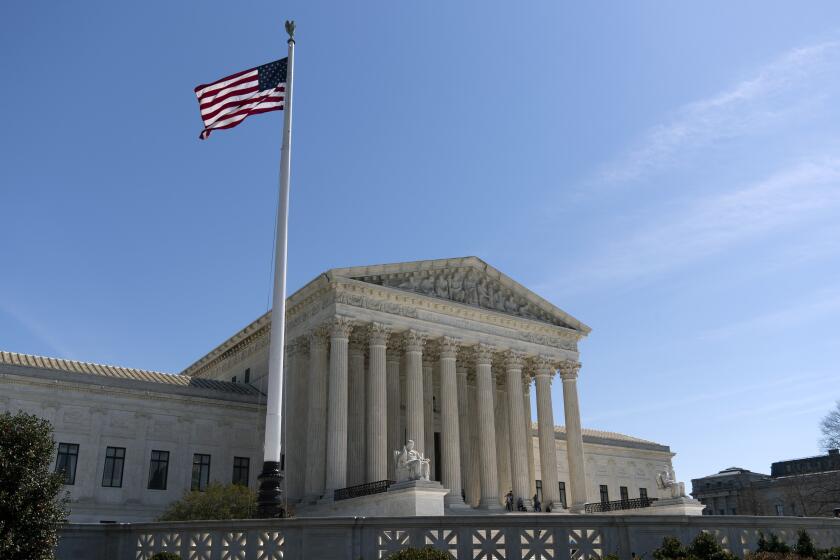Opinion: How far are the Supreme Court justices willing to go to remake constitutional law?

- Share via
In the last two years, the Supreme Court has dramatically moved constitutional law in a conservative direction. The court has overruled Roe vs. Wade, expanded gun rights, ended affirmative action by colleges and universities, found a 1st Amendment right of teachers to pray at school events, created an obligation of the government to subsidize religious schools when it provides funds to private secular schools, imposed a major limit on the authority of federal administrative agencies, and held that people have a 1st Amendment right to refuse to comply with anti-discrimination laws when it suits them.
These decisions were rendered by the most right-wing court since the 1930s, one determined to impose its own political agenda, without regard to earlier precedent or notions of judicial restraint.
The feds’ challenge is to find ways to fight the spread of disinformation, which can threaten public safety, without jeopardizing freedom of expression.
The justices return on Monday for October Term 2023, which will be another year of major decisions. Although only about half the cases the court will hear in this term have been set, major cases on gun rights, administrative agencies and speech on the internet already on its docket will show how far the justices are willing to go to remake constitutional law.
Gun rights. Federal law makes it a crime for a person under a restraining order in a domestic violence case to possess a firearm. Zackey Rahimi, a Texas man, assaulted his girlfriend and threatened to shoot her if she told anyone about the assault. A Texas court entered a domestic violence restraining order against Rahimi and barred him from possessing a gun. About a year later, while the order was still in effect, Rahimi was a suspect in a series of shootings. Police officers searched his home with a warrant and found a pistol, a rifle and ammunition. Rahimi was convicted of violating the federal law and sentenced to six years in prison.
But the U.S. Court of Appeals for the Fifth Circuit reversed his conviction and declared the federal law unconstitutional under the 2nd Amendment. In June 2022, in New York State Rifle and Pistol Assn. vs. Bruen, the Supreme Court ruled that gun regulations are permitted only if they are consistent with the nation’s “historical tradition of firearm regulation.”
For centuries, the 2nd Amendment was interpreted to be about protecting Americans. Thursday’s ruling perverts it to guarantee more and more slaughter.
A three-judge panel of the Fifth Circuit reasoned that since there were no restrictions on firearms in domestic violence cases in 1791, the current federal law had to be struck down. This case provides the Supreme Court the chance to reconsider its bizarre notion that all modern-day gun laws should be governed by 18th century standards. If it doesn’t, countless gun safety laws could fall because they did not exist 200 years ago.
Administrative agencies. The conservative justices have been obsessed with curtailing the power of federal administrative agencies. In the last two years, the court has struck down a federal regulation requiring COVID vaccinations in workplaces with more than 100 employees, denied the Environmental Protection Agency the authority to regulate greenhouse gas emissions from coal-fired power plants, and invalidated the Biden administration’s student loan relief program that benefited 43 million Americans. In each instance, it was a 6-3 decision, with the conservative justices invalidating progressive federal regulations.
Again, this term, the court seems poised to weaken federal regulatory power. In Consumer Financial Protection Bureau vs. Community Financial Services Assn. of America Ltd., which will be argued on Oct. 3, the court will review a Fifth Circuit court decision declaring an entire agency, the Consumer Financial Protection Bureau, unconstitutional because it receives funding directly from the Federal Reserve rather than from yearly appropriations from Congress.
Even in the face of clear threats to public health and the planet, the conservative justices severely limited the EPA’s authority.
Another case which the court will hear this term, Securities and Exchange Commission vs. Jarkesy, could pose an even greater threat to administrative agencies. The Fifth Circuit court ruled that it was unconstitutional for the Securities and Exchange Commission to use administrative law judges to adjudicate fraud cases rather than having to go to federal court for jury trials. If the Supreme Court agrees, many federal agencies that use administrative law judges and similar proceedings would be greatly hindered in enforcing laws that protect consumers, small businesses, and health and safety.
Loper Bright Enterprises vs. Raimondo also could dramatically reduce agency power. Almost 40 years ago, in Chevron vs. Natural Resources Defense Council, the court ruled that federal courts should give deference to agencies when they are carrying out their authority under federal statutes. This means that when the Environmental Protection Agency is acting to enforce the Clean Air Act or the Clean Water Act, courts should defer to the agency’s view of the law and what is needed to protect the environment. Businesses have long opposed the Chevron principle and want it overruled to limit the regulatory power of agencies. If the conservative justices do so, every type of federal regulation could be challenged.
Internet speech. On Friday, the Supreme Court granted review of two cases that concern whether states can regulate content on social media platforms. NetChoice vs. Attorney General of Florida and NetChoice vs. Paxton involve laws in Florida and Texas that prevent social media companies from engaging in content moderation or excluding some types of content.
Later this term, the court is likely to take up other crucial issues, such as whether the Food and Drug Administration had authority to approve mifepristone, a drug that is used to induce abortion; whether the Biden administration can encourage social media platforms to remove false content; and whether Donald Trump is disqualified from running for president by Section 3 of the 14th Amendment. With six conservatives, the effect of the court’s rightward swing is only just beginning to be felt.
Erwin Chemerinsky is a contributing writer to Opinion and the dean of the UC Berkeley School of Law. His latest book is “Worse Than Nothing: The Dangerous Fallacy of Originalism.”
More to Read
A cure for the common opinion
Get thought-provoking perspectives with our weekly newsletter.
You may occasionally receive promotional content from the Los Angeles Times.













